"A child psychologist said he couldn't help me because when I was baptized God had assigned me a different gender." "The heels disappeared from our house." "I know people who live double lives and are married with children because they are afraid to express their sexual identity." These are some of the testimonies of LGBTQI people living in Cyprus, as recorded in the report "Understanding the needs of LGBTQI+ people in accessing treatment and health care services", which was prepared in the framework of the Safe-R project by IMR/University of Nicosia.
Discrimination and stigmatization are a daily occurrence, while targeting can happen anywhere. In the family, at school, at work, on the road, and even in health services. It is no coincidence that 17% of LGBTQI people avoid going to the doctor, despite the fact that 50% face a disability or chronic illness.
The shocking data, testimonies and experiences
What they experience as LGBTQI people was revealed by the participants of the survey during interviews.
A 32-year-old trans man reported that he was rejected by a child psychologist, who invoked baptism as an act of divine gender attribution. "He told me that he couldn't help me because, when I was baptized, God had assigned me a different gender." The incident, although at a young age, posed barriers to accessing supportive care.
A transgender woman, over 50, described being punished when she expressed her identity: "When I started telling them I was a little girl, I ended up with a boyish haircut. The heels disappeared from the house," he said.
''I know people who live a double life – married with children – because they are afraid to express their sexual identity," said a 43-year-old lesbian woman, saying that many people also maintain a secret life.
''She kept saying that she would pass me on and that I would marry her cousin. It took her almost a decade to unlearn," said a 43-year-old lesbian woman.
Another person said his family had been particularly against him. "They never told me the word 'love'. I left home at 19, because I couldn't stand the silence anymore," he said.
''There's always a fear of who might find out – especially when you live in a village or small town," said a 60-year-old gay man. In such environments, he underlined, disclosure may seem impossible. "I came out very late, in part because in our community nothing stays private," he said.
"Being able to just walk somewhere without being stared at or judged remains difficult," said a 35-year-old person with a gender fluid.
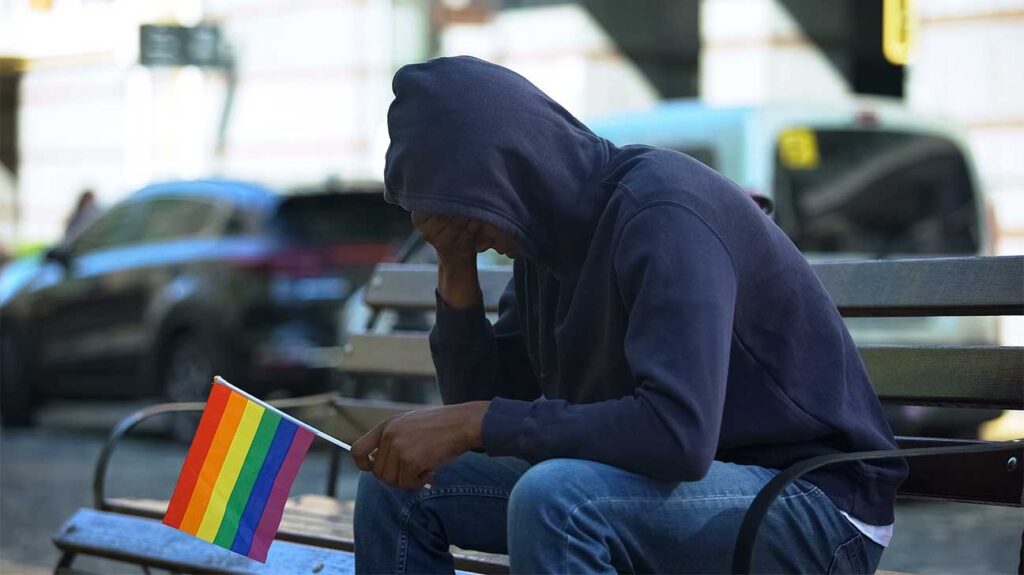
34% chronically ill or with a disability
The data that emerge in relation to the care received by LGBTQI people are worrying and extremely serious.
One in three (34%) of the survey participants reported having a disability, chronic condition or disease that requires regular interaction with the health system.
The most commonly reported issues were mental illness (24%), HIV/AIDS (17%), heart disease (12%), muscular dystrophy (10%), motor or visual impairments (7%), and physical disability (7%). 26% answered that they have other chronic diseases.
About one in three (36%) of the participants reported undergoing a medical check-up once a year. 27% answered twice a year, 13% make more frequent visits. However, 14% do not even undergo an annual check.
Half of the people surveyed (50%) reported that they only visit healthcare professionals when they feel unwell, while 27% said they visit a doctor rarely or on an irregular basis. "This finding is remarkable, given that 34% have a disability, chronic condition or disease, i.e. they belong to a group that is usually expected to be in need of care on an ongoing basis," the survey underlines.
Nevertheless, only a relatively small percentage reported that they make regular visits. "This suggests that even people with long-term health needs may have limited or inconsistent and irregular interaction with the health system," it said.
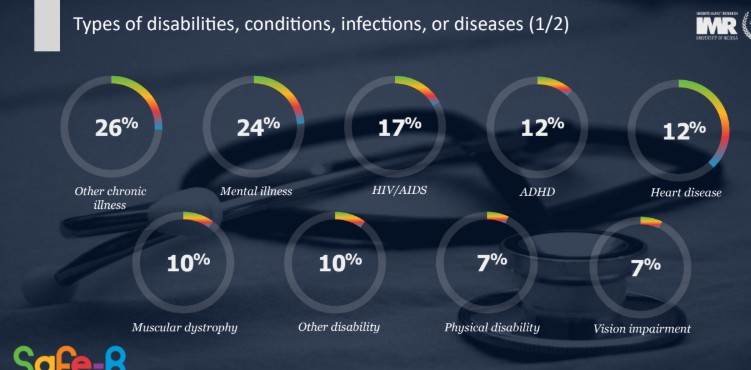
17% avoid the doctor out of fear
More than half of LGBTQ patients would not be able to pay
A portion of LGBTQI patients (17%) avoided visiting the doctor for fear of bad behaviour, while more than half (53%) did not seek medical services for financial reasons.
More specifically, 53% would not seek general medical or psychological support for financial reasons, while 40% clarified that they are not covered by the public or private health systems of the Republic of Cyprus.
26% cited a lack of desire or need for help as an obstacle to the provision of care. 23% the lack of trust in the services and 22% the fact that they do not know where to turn for help.
17% did not go to a doctor for fear of the prejudice they would experience. 15% due to negative experiences experienced with healthcare providers in the past as well as complicated bureaucratic procedures (10%).
Smaller percentages said they avoid seeking care because of their gender expression (1%) or sexual orientation (5%).
These results, according to the research, highlight both systemic and social barriers, which may prevent members of the LGBTQI+ community from accessing care. Financial insecurity and lack of public or private insurance cover emerge as the most pressing structural barriers, affecting more than half of the people surveyed. Furthermore, the data show alarming levels of distrust and uncertainty about the health system itself, with many people stating that they either do not know where to turn, do not trust the services provided, or fear that they will face bias from health care providers.
The fact that some individuals avoid seeking care because of their sexual orientation or gender identity and expression, even if their numbers are small, indicates persistent stigma and the need for more inclusive and affirmative gender environments.
Combined with references to negative experiences in the past and complex bureaucratic procedures, it becomes clear that for many LGBTIQ+ people, access to healthcare is not just a matter of availability, but is linked to psychological safety, respect and navigability of the health system. Addressing these multi-layered barriers is key to ensuring equitable access to healthcare and mental health support.
43% in therapeutic mental health sessions
43% of the participants in the survey answered that they attend therapeutic mental health sessions. Considering that 24% of individuals reported a mental illness and 34% a chronic condition or disability, it is understood that a significant portion of people with potential mental health needs are attending treatment.
People in treatment stated that they participate with frequency once a month (27%), once a week (25%) and once every two weeks (25%), in all cases in person.
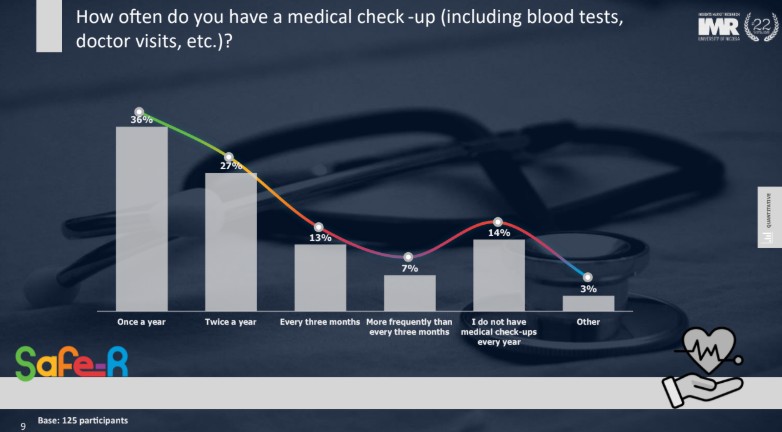
Most distinctions for specialist doctors
Psychologists and psychiatrists received the most positive ratings from the survey participants. 80% said they received information and support.
Personal doctors were also rated positively, with 78% of respondents reporting that the support they received was helpful.
The other specialties of health professionals received the lowest rating (51%), while it appeared that 66% had not visited a specialist doctor recently.
In the dark for monotherapy and gender reassignment surgeries
More than half (52%) did not know whether gender confirmation procedures, such as hormone therapy or surgery, are available in Cyprus. 34% answered that such benefits are offered and 13% believed that they are not.
This high rate of uncertainty, the survey points out, indicates the lack of accessible information on the possibilities of gender confirmation in the country's health system,
The insecurity is also evident from the way they evaluate health professionals in Cyprus in relation to the specialized needs of LGBTQI people. Only 4% of the participants said they were very satisfied, 19% satisfied, 33% rather satisfied. On the contrary, 8% said they were very dissatisfied, 16% dissatisfied and 7% rather dissatisfied. 14% chose not to answer.
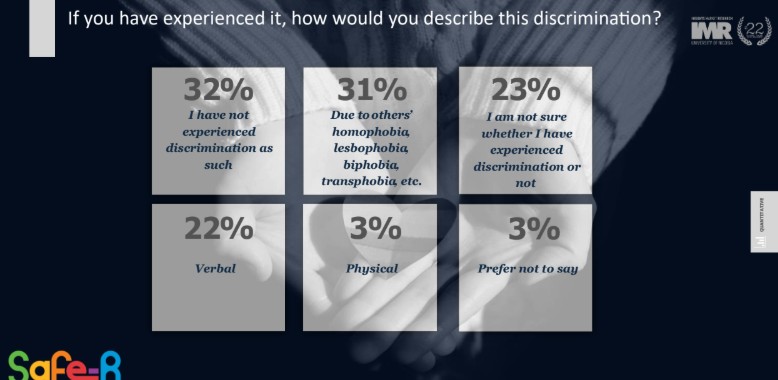
Discrimination in health care
Disagreement was expressed by the participants about whether they have experienced discrimination because they are LGBTQI during the provision of health services. 35% answered negatively and 34% positively, while 27% were unsure of their answer.
Of those who responded positively, 31% attributed the discrimination they experienced to homophobia, transphobia or similar prejudices. 22% reported verbal discrimination.
The vast majority faced negative backlash for behaving in ways that were considered "too effeminate" or "too masculine" based on social stereotypes.
63% have been treated negatively due to femininity and 39% due to masculinity.
6% experienced violence while seeking care
A small portion of LGBTIQ patients (6%) said they have experienced some form of violence while seeking health care. 11% were not sure if what they experienced constituted violence, while the vast majority (81%) answered that they had not experienced violence.
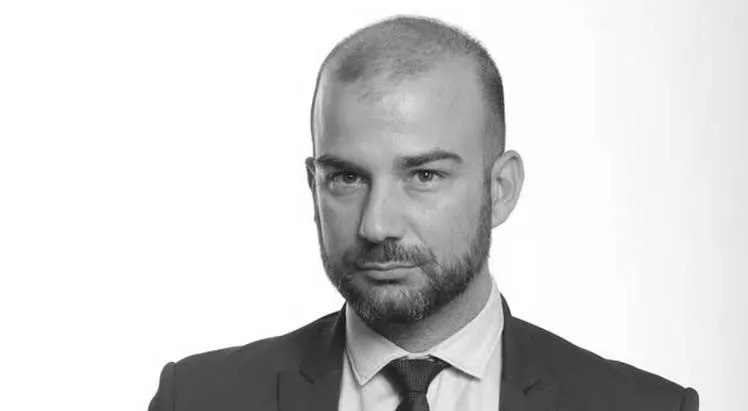
Stefanos Evangelidis: "They did not accept transgender people to a gynaecologist"
Accept LGBTQI receives complaints – Patients report minor attacks
"Many patients report experiences of micro-attacks, offensive behaviours, stereotypical perceptions or arbitrary assumptions based on heteronormative and binary standards," said the president of Accept LGBTQI Cyprus, Stefanos Evangelides, clarifying that they have received complaints.
''We had a trans man who a gynaecologist refused to see. This is an example of such behaviour," he said and added that discrimination undermines the quality of care provided and limits the feeling of trust and security towards the health system.
"Before conversion therapies were politicized, we were receiving complaints about attempts by experts to convert. Or complaints that they were rejected by doctors or that they were neglected or made fun of in the hospital," he said.
''Another example concerns endocrinologists, the majority of whom do not offer services to transgender people. This shows that we are behind," he underlined and added that many LGBTQI people avoid going to a doctor and delay seeking medical or psychological support. However, he said not all doctors are like that. "Many are interested and informed or even offer their services for free. But the attitude of doctors should not be left to their personal beliefs but to their professional status. Respect for the patient must be a given," he underlined.
"17% said they would not seek medical or psychological help because of bias, 15% avoided care because of previous negative experiences, and 6% because of their sexual identity or gender expression. Research shows that challenges are more complex and frequent for transgender people," said Mr. Evangelidis.
In the first comprehensive study of its kind in Cyprus, he underlined, the fact that there are gaps in relation to the education and training of specialists is also demonstrated. "This is also the reason why we underline, as Accept, that there is a need for immediate institutional action and we ask for it to be included in the National Strategy on Sexual Orientation and Gender Identity issues. To create a system that protects all individuals, in a context of safety and dignity, providing high-quality health services."
